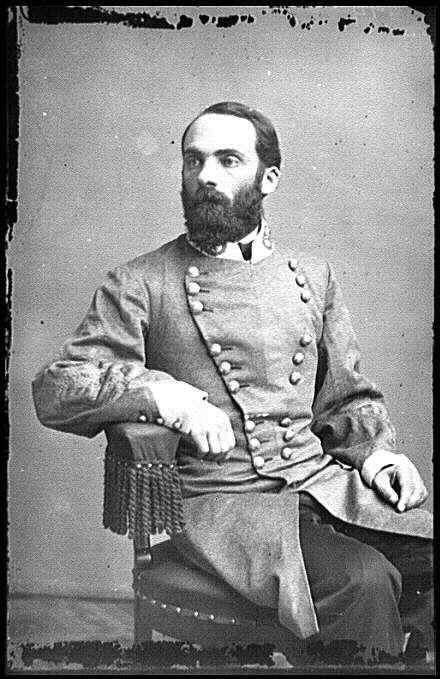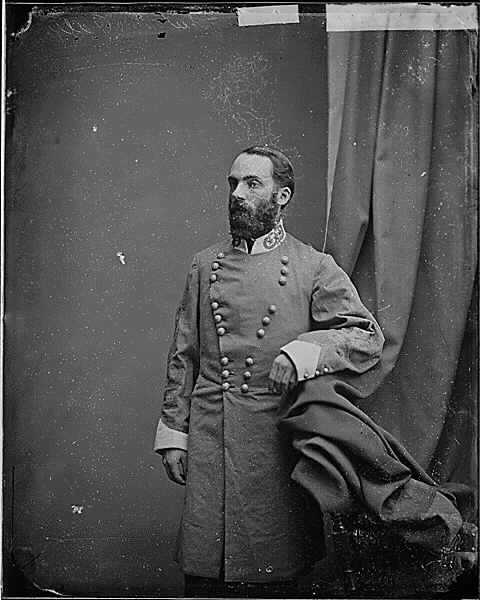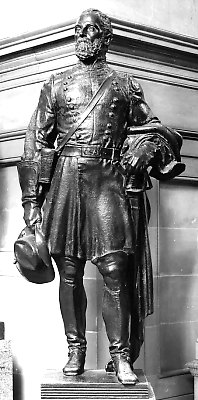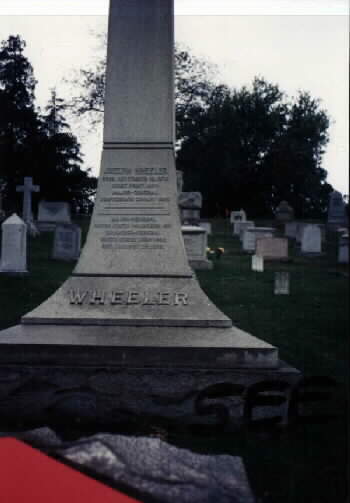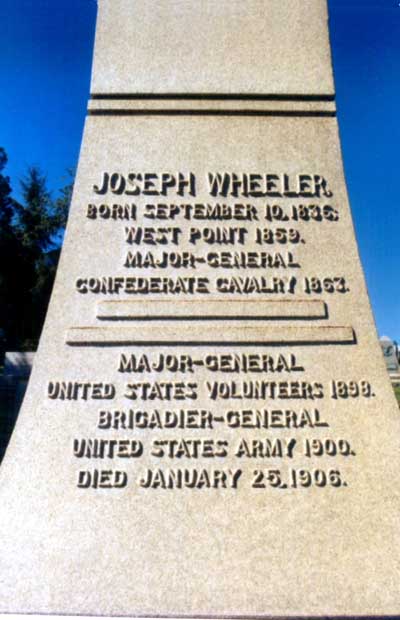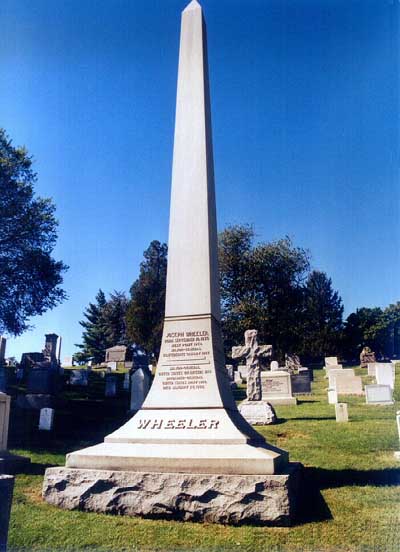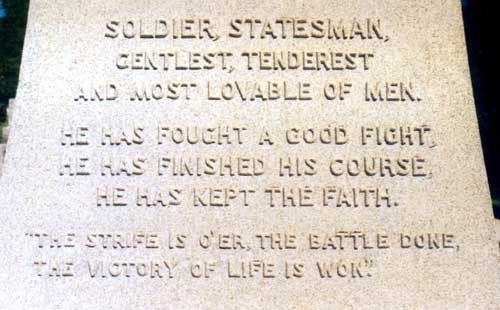Born near Augusta, Georgia, September 10, 1836, he graduated from West Point in 1859 and was commissioned in Dragoons. He saw service in various Indian campaigns in Kansas and New Mexico before resigning in April 1861 to become First Lieutenant of Artillery in the Confederate Army.
In September 1861 he was appointed Colonel of the 19th Alabama Infantry. He commanded a Brigade at Pittsburg Landing (Shiloh), April 6-7, 1862, where he covered the Confederate retreat on the second day, and in July was given command of the Cavalry in General Braxton Bragg’s Army of Mississippi. Thereafter he was almost continuously in the field.
During the remainder of the war he was to be wounded three times and had sixteen horses shot from under him. After leading Bragg’s advance into Kentucky in August-September, distinguishing himself at Perryville, October 8, and covering the retreat from that battle. He was promoted to Brigadier General, CSA, at the end of October. At Stones River (Murfreesboro) from December 31, 1862 to January 3, 1863, he again distinguished himself after having skillfully delayed General William Starke Rosecrans’ advance. In January 1863 he was promoted to Major General.
He took a prominent part in the Battle of Chickamauga, September 18-20, 1863 and, after Rosecrans was shut up in Chattanooga, undertook a spectacular cavalry raid to the Union rear in which he and his men destroyed railroad lines by which Rosecrans was to be re-supplied, and inflicted more that $3 million in damage to support depots and other resources in and around Central Tennessee. In November he cooperated with General James Longstreet in the siege of Knoxsville and, following Bragg’s defeat at Lookout Mountain and Missionary Ridge, November 24-25, helped cover the later’s retreat, taking part under General Patrick R. Cleburne in a rearguard action at Ringgold, November 27.
In 1864, he was active in opposing General William T. Sherman’s advance toward Atlanta, engaging Union cavalry of George Stoneman on several occasions. During Sherman’s March to the Sea, Wheeler fell back slowly in advance of him. He kept a close watch on Federal raiders and foragers on the flanks and thereby confined the destruction to as narrow a front as possible. In February 1865 (aged 28) he was promoted to Lieutenant General. He fought under General Joseph E. Johnston against Sherman in the Carolinas and, after Johnston’s surrender, was captured near Atlanta.
After the war, he entered business in New Orleans; moved in 1868 to Wheeler, Alabama, to practice law and plant cotton. He entered Congress in march 1881, but in June 1882 his seat was successfully contested. His successor soon died and he was elected to the same seat in January 1883 for the last two months of the term. He was again elected to Congress in 1884 and served from March 1885 until his resignation in April 1900. As he rose to the Chairmanship of the Ways and Means Committee, the high rank and personal popularity he had achieved in the Civil War made him something of a symbol of the reunion of the North and South in that period.
At the outbreak of the Spanish-American War in 1898, he offered his services and was appointed a Major General of U.S. Volunteers by President William McKinley in May and was given command of a Cavalry Division (largely unmounted) in William R. Shafter’s V Corps. Troops under his command (including Leonard Wood’s and Theodore Roosevelt’s ‘Rough Riders’) won the Battle of Las Guasimas, June 24, and took part in the assault on San Juan Heights before Santiago de Cuba on July 1, where they formed the U.S. right while Jacob F. Kent’s Infantry Division formed the left. At the conclusion of that campaign, he commanded briefly the convalescent camp at Montauk Point, New York, and also briefly commanded a Brigade in the Philippines, August 1899-January 1900. He was mustered out of the volunteer service and was appointed Brigadier General, United States Army in June 1900. He then commanded the Department of the Lakes until his retirement in September 1900.
He died at his sister’s home in Brooklyn, New York, on January 25, 1906 and was buried in Section 2 of Arlington National Cemetery, one of only two former Confederate generals to be buried in Arlington, the other being Marcus Joseph Wright.
General Wheeler’s son, Joseph Wheeler, Jr., Colonel, United States Army, is buried with him in Arlington National Cemetery.
Courtesy of the U.S. House of Representatives:
Representative from Alabama; born in Augusta, Ga., September 10, 1836; attended local schools and the Episcopal Academy, Cheshire, Conn.; was graduated from the United States Military Academy at West Point, 1859; attended the Cavalry School at Carlisle, Pa., 1859-1860; transferred to the Mounted Rifles June 26, 1860; second lieutenant September 1, 1860, and served in New Mexico; resigned from the United States Army February 27, 1861; appointed lieutenant of Artillery in the Confederate Army on April 3, 1861; successively promoted to the grade of colonel, brigadier general, and major general, and was commissioned lieutenant general in February 1865; in 1862 was assigned to the command of the Army Corps of Cavalry of the Western Army, continuing in that position until the war closed; senior Cavalry general of the Confederate Armies May 11, 1864; studied law; was admitted to the bar and engaged in practice at Wheeler, Ala., and also became a planter; presented credentials as a Democratic Member-elect to the Forty-seventh Congress and served from March 4, 1881, to June 3, 1882, when he was succeeded by William M. Lowe, who contested his election; subsequently elected to the same Congress to fill the vacancy caused by the death of William M. Lowe and served from January 15 to March 3, 1883; elected as a Democrat to the Forty-ninth and to the seven succeeding Congresses and served from March 4, 1885, to April 20, 1900, when he resigned; chairman, Committee on Expenditures in the Department of the Treasury (Fiftieth Congress), Committee on Territories (Fifty-third Congress); served in the Spanish-American War; commissioned major general of Volunteers May 4, 1898, and assigned to command of a Cavalry division, United States Army; senior member of the commission which negotiated the surrender of Santiago and the Spanish Army in Cuba; during the Philippine Insurrection commanded the First Brigade, Second Division, Eighth Army Corps, in the Tarlac campaign and in several other operations in central Luzon from July 8, 1899, to January 24, 1900; commissioned brigadier general in the United States Regular Army June 16, 1900; retired September 10, 1900; died in Brooklyn, N.Y., January 25, 1906; interment in Arlington National Cemetery.
Statue of Joseph Wheeler which is located in the National Statuary Hall In The US Capitol Building. It represents the State of Alabama.
Michael Robert Patterson was born in Arlington and is the son of a former officer of the US Army. So it was no wonder that sooner or later his interests drew him to American history and especially to American military history. Many of his articles can be found on renowned portals like the New York Times, Washingtonpost or Wikipedia.
Reviewed by: Michael Howard

